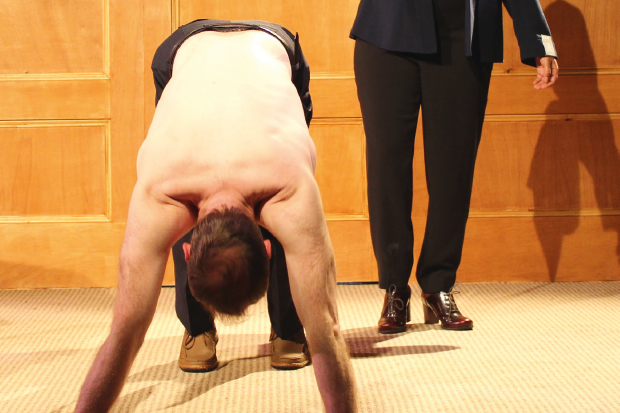Corbyn the Musical feels like it comes from the heart. Did the writers live through the 1970s when the hard-left was full of hope and confidence? Socialists then genuinely believed they could see off capitalism (which seemed in its death throes anyway) and replace it with a happier and more equal world. The show takes that objective seriously and attacks it with style, wit and affection.
Young Jezza is portrayed as a sweet-natured bumbler entranced by an ideology he barely understands. He expresses his political dreams in terms of manhole covers and allotment vegetables. With his racy girlfriend, Diane Abbott, he sets off on a motorbike tour of East Germany, which they both regard as a communist paradise. Jezza gushes about a society where consumers are no longer ‘paralysed by choice’. They join a 12-hour queue for a breadstick and call it a new form of happiness. When a traffic cop offers them cash for their jeans he’s shot dead at the roadside by a Stasi officer. Yet the tourists, quite unruffled, see this as proof of East Germany’s world-class judicial system. Some of the jokes are complicated and subtle. Jezza remarks on the humble origins of Heath, Wilson and Callaghan and declares with certainty that an Etonian will never again occupy No. 10. The pair visit an East Berlin nightclub where they meet a sinister Russian spy, Vladimir Putin, who is secretly gay and conceives an unrequited passion for young Jezza. Then we fast-forward to 2020. Jezza is prime minister and Britain faces the threat of nuclear conflict with Russia. Can he persuade his old admirer Putin to grant him a truce?
This improbable scenario is one of the weaker links in a show that still has plenty to offer. There are good tunes, funny lyrics, strong performances and an atmosphere of breezy merriment. The writers treat Marxism as a risible circus act rather than as a delusional menace. Some of the caricatures are spot on. Natasha Lewis plays Diane as a radical groupie, with a dash of Aretha Franklin, who wants Britain to become an egalitarian utopia where the top public schools remain at the disposal of superior persons like herself. James Dinsmore offers a hilarious portrait of Blair in a wheelchair (following a botched assassination attempt), who sings about his ‘hunger to be warmonger’. David Muscat is wonderfully camp as the soon-to-be-outed Putin, although his impersonation of Boris lacks point or originality.
The costumes can’t quite straddle the 40-year time span. Young Jezza looks perfect in a trim beard and a luxuriant wavy wig. But his present-day persona has the same beard and dark thinning hair so he resembles Kenny Everett in about 1992. The current run of the show has sold out but I foresee a long and successful tour. The West End may prove trickier. The plot falls apart in the final scene, the set designs could do with a larger budget and the writers seem to have improvised a marketing campaign without professional help. But the real problem is Mr Corbyn. His failure to command international attention means that this spoof has zero appeal to overseas playgoers. It’s up to him.
Boy at the Almeida takes place on a conceptualised set with a conveyor-belt snaking in and out of the seating areas. All the shabby detritus of London life trundles past us: roadworks, bus stops, front doors, street signs, tube barriers. The actors play mouthy urbanites engaging in chippy and often insulting dialogue. Through this ugly muddle wanders a lonely teenage boy who longs to reach out and make contact with his fellow citizens. He fails. He broods. He walks on.
I sensed that this was a Brechtian torture job intended to make yuppie playgoers squirm with guilt at their enjoyable careers, comfy homes, full bellies and busy diaries. I then noticed that the boy, played by Frankie Fox, had a mesmerising quality. The details of the show began to impress me with their artful accuracy. The unfinished bus stop conversations, the bursts of Croatian exchanged by labourers, the prowling security guards, the jumpy drug dealers, the brittle and aggressive chatter of the schoolgirls, it all began make sense. Reality pressed through the artifice of presentation and I realised that this huge canvas had been assembled with great care. The fractured rhythms of the dialogue had an engaging veracity. The boy’s sensitive mournful face revealed him as a brand-new type of Londoner, a native who feels like an alien in his home town because he lacks the equipment to thrive in the capital. Without charm, money, ambition and friends you’ll be chewed up by London and spat on to the scrapheap. The show offers that disturbing message in a quiet and unshowy way. It’s the finest homily on alienation I’ve ever witnessed.
Got something to add? Join the discussion and comment below.
Get 10 issues for just $10
Subscribe to The Spectator Australia today for the next 10 magazine issues, plus full online access, for just $10.
You might disagree with half of it, but you’ll enjoy reading all of it. Try your first month for free, then just $2 a week for the remainder of your first year.














Comments
Don't miss out
Join the conversation with other Spectator Australia readers. Subscribe to leave a comment.
SUBSCRIBEAlready a subscriber? Log in